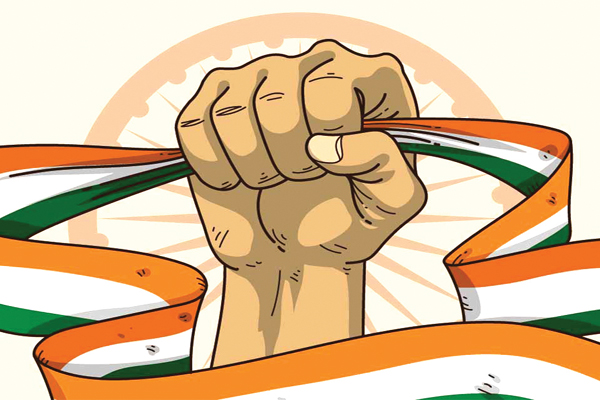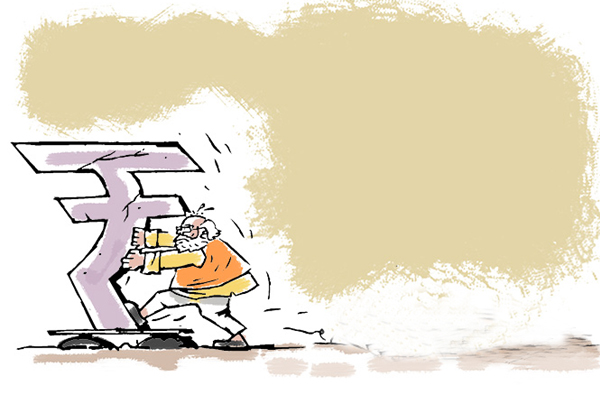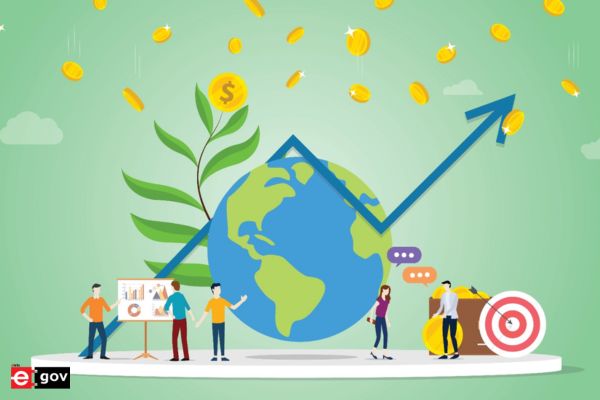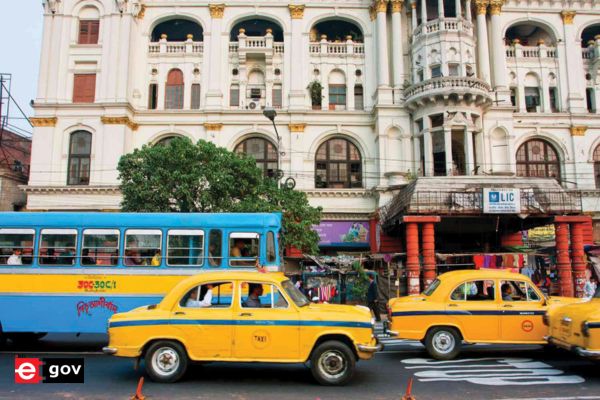
In May 2020, when countries across the globe were struggling to stay afloat in the troubled waters of the COVID pandemic, Prime Minister Narendra Modi showed a vision of making India AatmNirbhar to the citizens of the country. Since then numerous initiatives and policy reforms have been taken up by the government to trail the path to self-reliance, writes Adarsh Som of Elets News Network (ENN).
The past seven years have seen dramatic ups and downs in the graph of India’s growth and development. Presently, India is a key player in the global economic landscape. The country’s trade policies, government reforms, schemes and inherent economic strengths have positioned it as one of the most sought-after destinations for foreign investments. However, the entire picture has not been rosy so far.
The infamous COVID pandemic shook the country’s economy and caused huge losses to the government, private sector, public sector and majorly the lives of citizens. The scenario, during the second wave of the COVID, was grim to the extent that crematoriums and cremation grounds were out of capacity to handle the number of the dead. The COVID pandemic has not just impacted the Indian economy adversely but it disrupted the global value chains that connect producers across multiple countries. The aftereffects of the disruptions may carry on for years. Economists and experts across the globe have started arguing that the COVID crisis would not just unravel globalisation altogether rather it may trigger the worst economic downturn since the Great Depression.


Collaborative efforts of the States and the Centre to boost India’s economy
Source: https://images.newindianexpress.com/uploads/user/imagelibrary/2020/5/26/w900X450/SELF.jpg?w=400&dpr=2.6
According to the World Trade Organisation (WTO), in the year 2020 due to the pandemic, world merchandise trade in nominal dollar terms fell by 8 per cent while commercial services exports declined by 20 per cent. Though vaccination posed a ray of hope and WTO predicted that the world merchandise trade volume would likely increase by 8 per cent in 2021 but its growth trends tend to slow down to 4 per cent in 2022 and will remain below the pre-pandemic trend (WTO, 2021).
Despite the mammoth challenges, looking on the brighter side, the Government of India took a major initiative during this grave situation. While governments across the globe were lamenting the challenges that surfaced due to the COVID crisis, Prime Minister Narendra Modi took a bold decision and launched AatmaNirbhar Bharat Abhiyan, a mission to make India ‘Self-Reliant’.

Making India Self-Reliant
On 12 May 2020, Prime Minister Narendra Modi called out to the people of India and launched an economic and comprehensive package worth Rs 20 lakh crore which was equivalent to 10 per cent of the country’s GDP. Under the package, the Government aligned several bold reforms including a rational tax system, supply chain reforms for agriculture, upskilling of the human resource, digitisation of the government operations and services, simple and clear laws, and making India a US $5 trillion economy.
As per the Prime Minister, Self- Reliant India or AatmaNirbhar Bharat will stand on five pillars – Economy, Infrastructure, System, Vibrant Demography, and Demand. While naming these five pillars of AatmaNirbhar Bharat, he said – “We need an ECONOMY that does not bring incremental change but take quantum leaps. We need an INFRASTRUCTURE that will become the identity of modern India. We need a SYSTEM that is no longer based on outdated rules and rituals but the one that has the potential to give wings to the dream of 21st century India. This system has to be technology-driven. We are the world’s largest democracy and our vibrant DEMOGRAPHY is our strength. The cycle of DEMAND and supply in our economy is an asset. We need to utilise this fully.

Emerging AatmaNirbhar Bharat
Source: https://indiaglocal.com/wp-content/uploads/sites/2/2020/09/atmanirbhar_shubham.jpg
The stimulus package that the Government released under the AatmaNirbhar Bharat Abhiyan consists of five tranches – Businesses including MSMEs, Poor people and farmers, Agriculture, New horizons of growth, and Governance reforms as an enabler.
Despite the numerous challenges and hardships that the COVID pandemic brought forth, the Government of India saw it as a blessing in disguise and portrayed it as an opportune time to emerge as a powerful nation globally and become
self-reliant.
However, “AatmaNirbharta” or self-reliance does not refer to being a self-centred system or becoming self-sufficient. As the Prime Minister during his address to the nation said, “When India speaks of becoming self-reliant, it doesn’t advocate a self-centred system. In India’s self-reliance; there is a concern for the whole world’s happiness, cooperation and peace.” He added, “We are standing at a crucial juncture. This crisis has a message for us. It has provided us with an opportunity. We have to protect ourselves and move ahead as well.”
The Way Forward
The ideas of self-reliance, self- sufficiency, Make in India, and Vocal for Local are components of a bigger narrative of the “Swadeshi Movement”. A movement that refers to “of one’s own country”. Mahatma Gandhi, the Father of the Nation, was one of the first and most popular advocates of the Swadeshi Movement in the past century.
Prime Minister Narendra Modi with the launch of the AatmaNirbhar Bharat Abhiyan re-incarnated the Swadeshi Movement in a modern form to bolster India’s growth and development amidst the COVID pandemic.
Considering the way forward for the AatmaNirbhar Bharat vision, the Government of India’s initiatives have shown significant progress towards competitive federalism during recent years in the implementation of various policies. Some of these include – the formation of the GST Council, which gave equal weight to the states to form a national fiscal policy, a high-powered committee of chief ministers to recommend reforms in the Indian agricultural
markets, and more.

The government’s efforts to uplift India’s economy
Source: https://im.rediff.com/news/2019/may/27modi-economy.jpg
Considering India’s unique challenges competition alone cannot produce the best outcomes; it is competition combined with collaboration that will bring about true change. Therefore, India needs a combination/balance of cooperative and competitive federalism to ensure self-reliant sustainable development.
Understanding the significance of the same during the 6th Governing Council meeting of the NITI Aayog the Prime Minister stated, “The essence of the country’s progress is that the Centre and the states work together and move in a definite direction. We have to make cooperative federalism more meaningful and try to take the competitive cooperative federalism down to the state and district level so that the competition for development continues and development remains a prime agenda.”
Developments in digital technologies during the last three decades and especially after the pandemic have reformed, deepened, and transformed the governance in the world. Adequate governance for the countries operating in a volatile, uncertain, complex, and ambiguous world is not enough – good, responsive, and citizen-friendly governance is critical. Therefore, policymakers are not just required to be fast-paced and dynamic in their decision-making, they are also supposed to navigate the disruption, regulatory change, challenges, and opportunities to ensure sustainable growth and meet the needs of multiple stakeholders based on evidence created through various data analytics tools¹.
OUR INITIATIVE
Elets Technomedia, through its eGov Magazine and several conferences and webinars, has been at the forefront in advocating good governance practices. The vision of making India AatmaNirbhar is a transformational move by the Government of India. This aims to make the country and its citizens self-reliant in the true sense. From taking effective measures to uplift the small businesses, MSMEs, local craft, and startups to empowering the poor, especially the farmers, with several monetary benefits under the government schemes, the AatmaNirbhar Bharat package has proven to be a revolutionary move in all facets.
In an effort to contribute to the massive drive to make India self-reliant, Elets Technomedia presents Elets AatmaNirbhar Bharat Summit and Awards on 19-20 April 2022. A one-of-its-kind hybrid summit that aims to bring together top bureaucrats, thought leaders from the industry and academia to one platform to brainstorm on India’s journey towards becoming AatmaNirbhar. The Union Minister for Micro, Small & Medium Enterprises (MSME) Narayan Rane is the Chief Guest at the summit.
The conference will discuss the impact of the COVID pandemic on the country’s economy, highlight the resilience of our economy and identify the sectoral opportunities for making India a self-reliant global power in the post-COVID world. Some of the key sectors for discussion would include IT & E-Governance, Smart Cities, Urban Development, Housing, Industries & MSME, Transport, Railways, Water & Sanitation, Education and Skill Development, etc.
The Day 1, which is an in-person event at the Royal Plaza Hotel, Connaught Place, New Delhi, will witness three power-packed panel discussions and two special panels themed Policy Talks. Big names including UP Singh, Secretary, Ministry of Textiles, Government of India; Sanjay Jaju, Additional Secretary (DP), Ministry of Defence, Government of India; Dr Rajendra Kumar, Additional Secretary, Ministry of Electronics & Information Technology (MeiTY), Government of India; Abhishek Singh, CEO, MyGov, President & CEO, NeGD and MD & CEO, Digital India Corporation, Government of India; Amber Dubey, Joint Secretary, Ministry of Civil Aviation, Government of India; and Dr Neeta Verma, Director General, National Informatics Centre (NIC), Government of India, will lead the inaugural session of the two-day summit.
Invaluable deliberations on the topics covering the opportunity, innovations, citizen engagement and the roadmap to becoming AatmaNirbhar will make up the Day 1 of the summit. While Day 2 will see talks on transformative governance, leveraging technology solutions, water conservation, sustainable mobility, and security infrastructure themes.
The summit will also confer Elets Innovation Awards to celebrate the spirit of innovation and recognise the path-breaking initiatives in the aforementioned sectors.
1. Aatma Nirbhar Bharat Abhiyan — Theory, Actions and Way Forward by Indian Institute of Publc Administration, New Delhi
Be a part of Elets Collaborative Initiatives. Join Us for Upcoming Events and explore business opportunities. Like us on Facebook , connect with us on LinkedIn and follow us on Twitter, Instagram.











